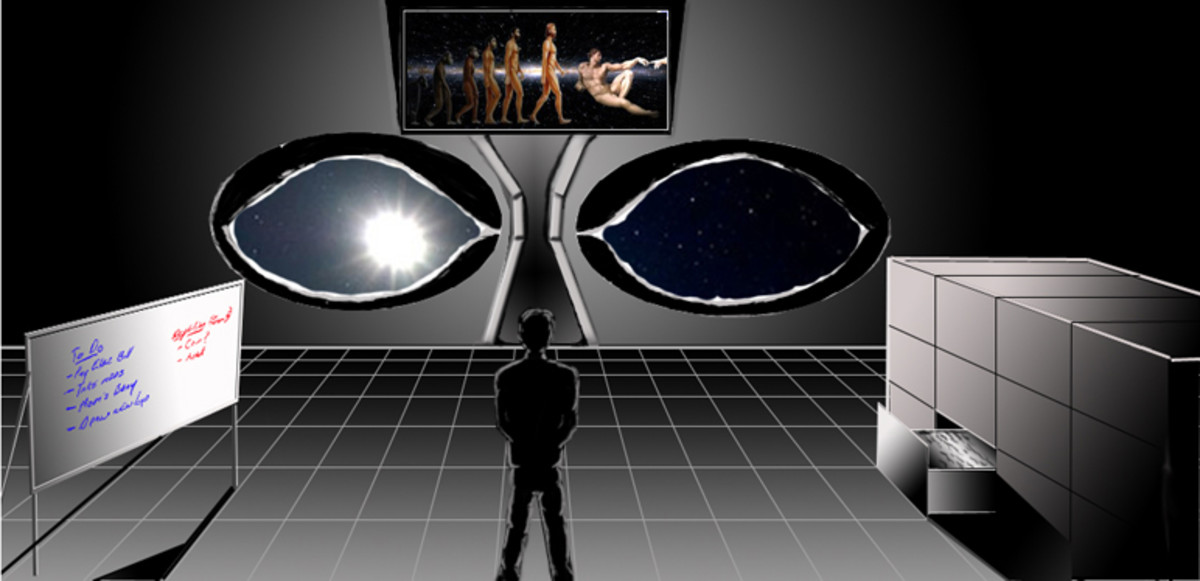The Bible for Atheists: Contradictions or Clues?

No mere mortal knows what God is. Does God even exist? To an atheist, of course not. For an atheist, there is not necessarily any certainty on this, but there is certainly a disbelief that God exists. Some atheists with whom I have discussed this topic are certain that God does not exist. Such certainty is curious and seems tantamount to blind belief—almost a "faith." Some erroneously accuse atheists of having their own religion because of such apparent "faith," but such a strong, unsubstantiated belief might prove to be merely an idée fixe.
The problem with belief is that it is frequently wrong. And this is a funny problem, because in Christianity (as well as perhaps most religions), there are so many different beliefs. Most, if not all, of them are wrong. That remains only logical. Conflicting beliefs cannot all be right, but certainly the possibility exists that they can all be wrong. It is entirely possible that, while the Bible may be valid, but with much of its wisdom remaining hidden, all of the interpretations could be invalid.
Stephen Hawking, the renowned physicist and author, recently told the press about his belief that there is no God and that (as the Guardian reported), "... humans should therefore seek to live the most valuable lives they can while on Earth." Of course, that's good advice whether God really exists or not. That's good advice whether or not our true selves ("souls"?) are immortal or not. Each moment is precious and should not be wasted. But Mr. Hawking also said that the "afterlife" is a "fairy story."
It sounds as though Hawking is entirely certain about his beliefs, but where is his proof? Naturally, there is no proof that God exists, except perhaps the physical universe we live in, but Hawking finds a different interpretation of things. In his most recent book, The Grand Design, he says, "Because there is a law such as gravity, the Universe can and will create itself from nothing. Spontaneous creation is the reason there is something rather than nothing, why the Universe exists, why we exist. It is not necessary to invoke God to ... set the Universe going," Perhaps it is not necessary for Hawking to invoke "gravity," either. The truth is the truth, no matter what we want it to be, whether it is quarks, mu mesons, God, gravity or the tooth fairy behind it all. And what is it that put "gravity" there to make something out of nothing? I'm afraid Mr. Hawking has not solved the equation, yet. The answer is still out there.

If God did Exist, What Would It Be?
The Bible, and religion in general, deal with moral issues and a non-physical aspect to man. Buddhism does not have a godhead, but it talks of non-physical and ethereal things. Buddhists talk of the non-self (the opposite of selfishness or ego).
They also discuss something called the "paramita"—the "other shore" of existence where perfection lays waiting. That perfection is like a one-sided coin—it is "generosity" without the slightest hint of "selfishness." It is "compassion" without any "indifference," or "wisdom" without even a hint of "stupidity."
Perhaps most interestingly, the paramita can be "confidence" without the tiniest element of "doubt." So much for skepticism. But this is not "belief;" it remains quite superior to "belief." The Buddhists may not have a god figure, but could it be that this is another description of "God?" Could it be that, to them, this quality or state of being is so indescribable that they cannot anthropomorphize it as so many seem to have done with the concept of "God?" Could it be that in attempting to do so, one would be tarnishing the actual by giving it an unrealistic label?
If we were to define the Judeo-Christian "God," it might be something like this: "a non-physical, spiritual and immortal source of creation." They have a law against "graven images," because their God has no physical form. Such a statue or other physical symbol would thus be a lie and a distraction from what is, to them, truth.
The first book of the Bible describes this "Father of the universe" creating "man" in His own image. Now, one thing that most Jews and Christians would vehemently deny, is that this seems to mean that we are each individually "baby gods." Don't laugh too hard. What if it were true? What if, beneath the physical Homo sapiens shell, an immortal lay sleeping?
The problem with such an idea is that ego gets in the way. Ego is a physical universe construct. It obeys the laws of action-reaction. Remember Newton? It is vulnerable. A bruised ego is a horrible thing to behold.
The intent of the Bible, and in fact most religions, seems to be to awaken that non-physical aspect. Ego wants every bit of that power. Could it be that the idea of "God" is a foil for ego—a symbol to help thwart that most vulnerable part of what makes us human? So, when a magical miracle occurs, could it be that it is not the self (especially not the ego self) which does the miracle, but instead the "will of God" (whatever that is)? For the inner immortal to claim responsibility for such magic, would only make ego salivate with envy. And then it becomes very difficult to tell which "me" is the true self. This defeats the purpose of spiritual awakening. This almost becomes a Catch-22 situation—damned if you do and damned if you don't. Ego is a slippery devil—a shape-shifter and a con artist.
When the founder of Christianity said that he and his heavenly Father were one, could he have been alluding to the idea that God is the combined spiritual force of us all? He seems to open the door to this idea when he reminded his enemies (who were about to stone him for blasphemy) that "ye are gods."
Elsewhere, I describe the difference between a truly extraordinary "miracle" and an "ordinary miracle." One is a cause-and-effect circumvention of physical law, while the other is merely a product of physical circumstance—a "happy accident." I have seen the extraordinary variety and this proves one thing to me—that there is something superior to physical law, something which possesses a consciousness. And it may be quite different from anything anyone has yet conceived about this notion of "God."
For believer and non-believer alike, these may seem to be strange ideas. It is quite possible that none of these ideas are true, but from my own experience and research, they answer so many of the Bible's apparent contradictions and enigmas.

The Bible is a Book
Is it anything more than merely a piece of ancient literature? What if it were? What if a powerful wisdom were hidden inside reachable only by those who approached it with reverence and humility? To the arrogant atheist who is not interested in looking any further (they already have it all figured out), such reverence and humility prove to be impossibilities. To the curious atheist who does not cling to any one ideology, such attitudes might be achievable, with practice.
The Bible contains many stories, quite a number of them too incredible for many to believe. And others believe everything written therein with an unshakable conviction. And what if that powerful wisdom were to be denied all those believers simply because they lack the humility to search for new answers? They already think they know it all. Sound like someone you know?
Why would powerful wisdom be hidden in the Bible? Good question. And there are at least two powerful answers.
Have you ever known anyone who received a gift or had won some prize and who quickly trashed it or wasted it? It was "free" so it was not that "valuable." Many a lottery winner lost not only their newfound wealth, but everything they'd had before their windfall. Why? Perhaps they lacked the skills to manage such a fortune—both emotionally and intellectually.
Give someone a great deal of power, and they might quickly squander or abuse it. Jim Carrey's Bruce Almighty comes to mind, as an example. Though the movie is pure fiction, it tellingly reveals some very human weaknesses.
The other drawback of instant anything involves ego. Such a boon is likely to go to the head of the recipient. Their swelled ego results in arrogance and contributes to the first failure.
The first drawback is the wasted opportunity. The second drawback is the damage to the personality.
How can the Bible contain "powerful wisdom" if there are so many problems with what the Bible says? This, of course, is another good question.

Contradictions or Clues?
If you wanted to have your readers work for their answers, how would you do it? How would you lay down a series of clues that led to the things you wanted to reveal?
One way is to say something crazy or non sequitur . Women do this all the time, and the guys so often don't pay enough attention.
That happened to me once. I was dating one of the most beautiful woman I had ever seen. A few weeks into the relationship, we were on our way to lunch, making small talk, and she quipped that she had never received a speeding ticket, then remarked that her father was a police captain. Any dolt can think that the two statements were related. "Ah, her father arranged things to make speeding tickets disappear." Nope, that wasn't it. It took me a long time to figure out what she was really trying to tell me. Too long! And there were many other, similar clues. She was trying to tell me that I was not moving fast enough in the relationship. If only I had known! Alas!
Missing the clues is something a lot of people do. They find an easy answer and quit, thinking that they know it all. They get lazy. Both believers and non-believers do this.
The timeline found in Genesis provides us another example. Take it too literally and we have a contradiction. Science disagrees with the literal Genesis timeline.
Science works, and though it may not be perfect, it is batting close to a thousand. Belief in the literal Genesis timeline is therefore a delusion. Those who believe in this are ignoring reality—and what is delusion, if not the ignorance of reality?
Some scholars tell us to ignore the timeline in Genesis. The Bible, they tell us, was not meant to give us a literal history. That could be another form of laziness—"don't look."
But what if Genesis has clues to a real timeline, one that remains compatible with those of science? I have found such clues and the resulting timeline. A great deal more work needs to be done to corroborate this new Genesis timeline, but it stands as a very real breakthrough. It proves that, given sufficient temerity and persistence, but humility about what might lay ahead, answers can be found—answers which had lain hidden for millennia.
One such clue comes in Genesis 5:2, "Male and female created he them; and blessed them, and called their name Adam, in the day when they were created." Notice here that Adam is both male and female; Adam is plural ("them"). The outrageous longevity of the early patriarchs might not be so outrageous if the names applied both to the founders and their eponymous tribes.
Because science has found that humanity has been around far longer than the six thousand years in literal Genesis, the biblical timeline is obviously far too short. The ages of those "patriarchs" are far too small. Imagine that! The Methuselah tribe might have been around far longer than 969 years, while Methuselah himself might have lived to be only sixty.
The Bible contains clues which justify applying a factor to greatly enlarge the years given to each of those patriarchal "tribes." The result is a timeline which exceeds the current age of humanity found in anthropology. But hey, there are many more bones to be found.
Could it be that both biblical literalists and the hardened skeptics have been looking in the wrong directions? Some interpretations are better than others. Scientists, in attempting to interpret nature, sometimes know this. Humility allows them to look further. Humility allows one to find far more in the Bible, too.
Also
"The Bible for Atheists: Suffering and a Loving God" (coming soon).
"The Bible for Atheists: Science and the Supernatural" (coming soon).











